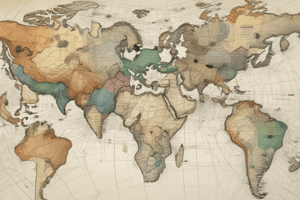Podcast
Questions and Answers
What year was the first chain in International Relations established and where?
What year was the first chain in International Relations established and where?
1919 at the University of Galles in Aberystwyth.
Which notable supporter of 'idealist' liberalism was associated with the first chain in IR?
Which notable supporter of 'idealist' liberalism was associated with the first chain in IR?
Prof. Alfred Zimmern.
What significant event during World War I highlighted the need for the study of International Relations?
What significant event during World War I highlighted the need for the study of International Relations?
The scale of casualties and destruction in battles like the Battle of the Somme.
Why was the establishment of Institutes dedicated to International Affairs delayed until 1927?
Why was the establishment of Institutes dedicated to International Affairs delayed until 1927?
Signup and view all the answers
What concept is often associated with the complexities inherent in International Politics?
What concept is often associated with the complexities inherent in International Politics?
Signup and view all the answers
What is the primary downside of using propaganda in international affairs?
What is the primary downside of using propaganda in international affairs?
Signup and view all the answers
What are the three strategies highlighted for analyzing international conflict?
What are the three strategies highlighted for analyzing international conflict?
Signup and view all the answers
Why might the categorization of international affairs into different levels of analysis be limited?
Why might the categorization of international affairs into different levels of analysis be limited?
Signup and view all the answers
What does the individual level of analysis focus on in international relations?
What does the individual level of analysis focus on in international relations?
Signup and view all the answers
What is the main concern of the systemic level of analysis in international affairs?
What is the main concern of the systemic level of analysis in international affairs?
Signup and view all the answers
What is the central challenge faced by groups, such as countries, when attempting to serve their collective interests?
What is the central challenge faced by groups, such as countries, when attempting to serve their collective interests?
Signup and view all the answers
How does the dominance approach help resolve conflicts in collective action problems?
How does the dominance approach help resolve conflicts in collective action problems?
Signup and view all the answers
What are the potential risks associated with the reciprocity approach in international relations?
What are the potential risks associated with the reciprocity approach in international relations?
Signup and view all the answers
How does identity contribute to solving the collective action problem?
How does identity contribute to solving the collective action problem?
Signup and view all the answers
In the context of the prisoner dilemma, why do states face the temptation to deviate from collective promises?
In the context of the prisoner dilemma, why do states face the temptation to deviate from collective promises?
Signup and view all the answers
What is the 'do ut des' principle and how is it related to reciprocal actions?
What is the 'do ut des' principle and how is it related to reciprocal actions?
Signup and view all the answers
What role does the higher-ranking actor play in the dominance approach to international relations?
What role does the higher-ranking actor play in the dominance approach to international relations?
Signup and view all the answers
What challenges can arise from the identity approach in collective action problems?
What challenges can arise from the identity approach in collective action problems?
Signup and view all the answers
Study Notes
Course Information
- Course: 30317 – Political Science and Comparative Politics
- Topic: Introduction to International Relations
- Instructor: Umberto Platini
- Email: [email protected]
International Relations as an Independent Subject
- International Relations (IR) is a relatively new academic field.
- The first dedicated IR program was established in 1919 at the University of Wales, Aberystwyth.
- Alfred Zimmern was a key figure in the development of IR, advocating for "idealist" liberalism.
- The Institut de Hautes Etudes Internationales et du Développement (IHEID) was founded in 1927 in Geneva, marking a significant step in the development of IR as a discipline.
Why International Relations is Relatively Recent
- Europe had a history of frequent but often localized warfare before World War I.
- The scale and severity of World War I fundamentally changed the understanding of war and international relations.
- The catastrophic loss of life (e.g., 1 million casualties in the Battle of the Somme), the devastation of infrastructure and resources, and implications for global power dynamics spurred the need for a more systematic study of international relations.
The Battle of the Somme (Example of WWI Impact)
- A particularly devastating battle in WWI. Approximately 1 million casualties in 141 days (an average of about 300 deaths per hour).
- The first day alone saw losses of 57,000 British soldiers, a staggering figure.
- The cost of gained territory was exceptionally high, with each kilometer costing more than 80,000 lives.
- In summary, the battle of the Somme epitomized the unprecedented destruction and scale of modern warfare.
Defining International Relations
- What comes to mind when thinking about IR?
- IR encompasses a complex interplay of concepts including international law, global governance, balance of power, collective security, international organizations, human rights, sovereignty, diplomacy, national interests, peace, war, geopolitics, and anarchy.
The Collective Action Problem
- International politics is often complicated because cooperation is challenging.
- Collective action problems stem from the tension between individual and collective interests.
- For example, countries may benefit from reducing greenhouse gases, but each country may also benefit from emitting those gases if it does not affect the global effort of reducing gases from each country.
Strategies for Addressing the Collective Action Problem
- Dominance: Imposing a hierarchy, where the dominant actor controls others. Example: The UN Security Council's veto power.
- Reciprocity: A system of mutual incentives and punishments for cooperation and defection. Example: Arms control agreements.
- Identity: Strong sense of shared values and community that motivates individuals to cooperate. Example: Charitable giving in times of crisis.
Additional Limitations and Considerations
- The categorizations of IR strategies can be overly simplistic. Most real-world instances involve a combination of these factors.
- A better understanding of the root causes of international conflicts, and interest divergences, is sought through these strategies.
- Further study on the different perspectives of understanding International affairs by categorizing them into specific levels.
Levels of Analysis Framework
- Individual Level: Focuses on individual decision-makers and their role in international events.
- Domestic Level: Focuses on domestic factors within states that influence their foreign policy.
- Systemic Level: Focuses on the interactions between states, considering their power positions, relative capabilities, and international norms.
Studying That Suits You
Use AI to generate personalized quizzes and flashcards to suit your learning preferences.
Related Documents
Description
This quiz explores the foundational aspects of International Relations (IR) as an independent academic field. It discusses key historical developments, notable figures like Alfred Zimmern, and the impact of World War I on global relations. Test your understanding of how IR evolved and its significance in modern politics.



